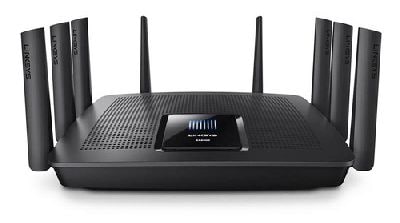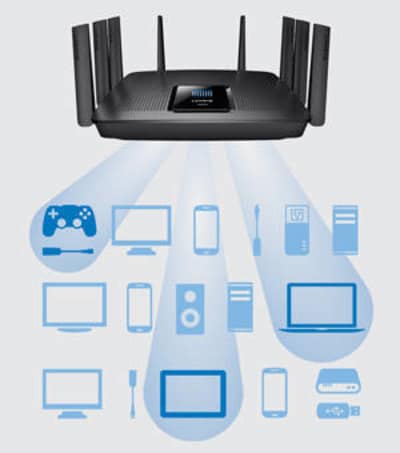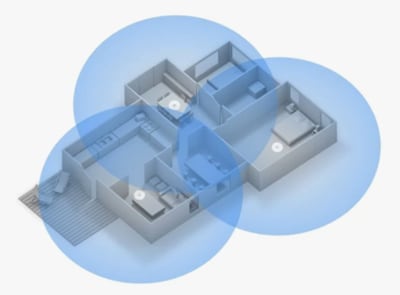Is It Time to Upgrade Your Wireless Router?
Posted on September 05, 2017 By Alison P
If you're like me, you don't spend a lot of time thinking about your wireless router. Once it's set up, you forget about it... until problems arise, that is. If your internet is spotty, there's lag while gaming, or it takes forever to download files, then your router suddenly becomes very important.
What Does a Wireless Router Do?
The speed of your Wi-Fi is based on a few factors:
- Internet speed from your provider
- Amount & type of usage received
- Distance from the router
Declining Performance
Like most people, I signed up with an internet provider and they conveniently supplied all the necessary equipment, including a router, and set up the TV and the internet. They even connected my laptop and smart TV to the Wi-Fi.
The equipment seemed adequate and the internet was quick enough. Fast-forward a few years and my Wi-Fi requirements have increased significantly. I expanded from two devices to 15, including a printer, tablets, phones, Wi-Fi security cameras, and additional smart TVs.
Netflix began to buffer more, video chats were freezing, and downloads took forever. As your smart home grows and your family expands, more users and devices come online. A basic router is pushed to the limits, and the available bandwidth shrinks until it becomes a hassle just to get online. I realized that when Wi-Fi usage expands, so does the need for a new router that can handle the strenuous load.
 Troubleshooting Your Network
Troubleshooting Your Network
Most Wi-Fi performance problems are caused by heavy device usage and lack of range. If your network is having issues, upgrading your router is a necessity. There are many benefits to getting a high-performance router, and reliable, secure, and fast internet speeds are reasons enough.
If you have multiple devices connected to your wireless router, speed and stability suffers. Online gaming and video streaming are the biggest culprits, which people often do at the same time.
A simple solution to relieve a stressed Wi-Fi network is to hardwire devices with Cat-5 (Ethernet) cables. This direct connection doesn't use Wi-Fi bandwidth, but hardwiring devices isn't feasible in most cases. Plus, running wires throughout the home and constantly plugging and unplugging devices isn't practical. Now what?
Bringing Your Network Back Online: What to Look For
Technology has changed a lot in the last few years, and routers are now blazingly fast. Note that listed router speeds are based on favorable settings with minimal use, so reaching top speeds isn't likely. Router speeds need to start out much higher than the incoming internet speed. That way, when they meet, and bandwidth is distributed amongst devices, you'll receive faster internet speeds that slower, basic routers are not capable of producing.
If you get a router with dual or tri-bands, it distributes appropriate bandwidth to devices that need it the most, further assisting with high-speed and reliable performance. Imagine each band as a lane on a highway: some lanes are fast while others are slower. Multi-band routers put bandwidth-hungry activities such as 4K movie streaming and online gaming into the "fast lane." It then shifts low bandwidth traffic, such as online shopping and emailing, into slower lanes without affecting the performance of online activity.
 Lack of Range
Lack of Range
Walls, floors, doors, and distance are Wi-Fi's worst enemies. Homes that are over 1,500 sq. ft. or have more than one level can experience dead spots where Wi-Fi is slow or non-existent. Normally a Wi-Fi extender can solve the problem, but if you're online gamer, stream HD movies, or work from home, the Wi-Fi extender may not deliver the speeds you need. In this case, a Mesh Wi-Fi Router is your best bet.
These mesh networks use multiple routers that spread out to create seamless Wi-Fi across your home. Plus, these routers are sleek and easily blend into modern dcor, so they won't stick out.
This type of system can also be used to alleviate heavy usage problems by easily prioritizing and routing Wi-Fi bandwidth traffic, maintaining extremely fast speeds for connected devices.
An Investment for the Future
Connected devices are becoming commonplace in our everyday lives - even appliances can connect to the internet now! Whether your family is expanding or you're adding to your home automation system, you'll need better Wi-Fi performance. A new premium Wi-Fi router is a simple solution, so be sure to upgrade today for a better experience in the future. I did, and it's the smartest thing I've ever done for my smart home.